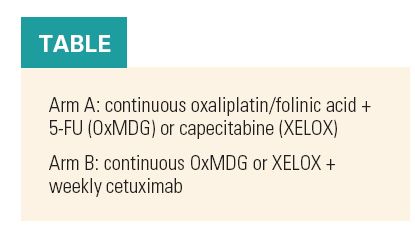Trials turn in mixed findings for first-line cetuximab in colon cancer
BERLIN-The failure of a major colon cancer trial to reach its primary endpoint surprised even the most seasoned gastrointestinal cancer investigators. Overall survival was not improved when cetuximab (Erbitux) was added to a first-line oxaliplatin-based regimen (Eloxatin), according to phase III COIN trial at ECCO/ESMO 2009.
BERLIN-The failure of a major colon cancer trial to reach its primary endpoint surprised even the most seasoned gastrointestinal cancer investigators. Overall survival was not improved when cetuximab (Erbitux) was added to a first-line oxaliplatin-based regimen (Eloxatin), according to phase III COIN trial at ECCO/ESMO 2009.
But it wasn’t all bad news, because updates from the phase III CRYSTAL (cetuximab plus FOLFIRI) and OPUS (cetuximab plus FOLFOX) trials found benefits associated with first-line cetuximab.
KRAS status makes no difference
The COIN study, conducted by the UK-based Medical Research Council, was the largest trial of an epidermal growth factor receptor (EGFR)-targeted therapy used first-line for advanced colorectal cancer, said Tim Maughan, MD, professor of cancer studies at the school of medicine at Cardiff University and honorary consultant clinical oncologist at Verlindre Hospital, both in Cardiff, Wales (abstract 6LBA).

The trial was unusual in that it prospectively analyzed the data for KRAS status. The investigators determined KRAS status in 80% of patients, finding wild-type KRAS in 56% and KRAS mutations in 44%. KRAS wild-type is associated with a favorable response to EGFR inhibition.
The 1,630 patients in the study received one of two oxaliplatin-based regimens chosen by their physicians. Two-thirds of the patients received oxaliplatin and capecitabine ([Xeloda], see Table).
Unexpectedly, in patients with wild-type KRAS tumors, median overall survival (OS) was not significantly improved with the addition of cetuximab: 17 months vs 17.9 months with chemotherapy alone. Median two-year survival was 36% and 34%, respectively, and progression-free survival (PFS) was 8.6 months in both arms.

“The addition of cetuximab to oxaliplatin-based chemotherapy was associated with increased nonhematological toxicity and no change in OS or PFS for all patients and for KRAS wild-type patients as well in this study,” Dr. Maughan said. Overall survival in patients with KRAS mutations was 14.8 months with chemotherapy alone and 13.6 months with the addition of cetuximab. Two-year survival was 21.9% and 28.2%, respectively, in the mutated subgroup. None of the differences in endpoints were statistically significant.
Dr. Maughan questioned whether the very advanced disease in the COIN population (41% unresected primary tumors) may be one reason for the negative results. He also noted a small differential in outcomes based on which chemotherapy backbone the patients received. Those treated with infusional 5-FU appeared to have a somewhat more favorable PFS than those who received capecitabine, which is consistent with previous studies, he pointed out.
Patients who received cetuximab also experienced significantly more grade 3 or 4 diarrhea, rash, fatigue, hand-foot syndrome, and hypomagnesemia, but significantly less grade 3 or 4 peripheral neuropathy than the control arm. Grade 3 or 4 nonhematological toxicity was observed in 57% of the chemotherapy-alone arm and in 74% of the cetuximab arm (P < .0001).

Gastrointestinal cancer investigators who heard the COIN data struggled to make sense of the findings. Alberto Sobrero, MD, of the Ospedale San Martino, Genoa, Italy, and principal investigator of the EPIC trial (cetuximab in the second-line setting), said that pending more information, the message for cetuximab is clear. “Do not use cetuximab with FOLFOX or XELOX, at least in the first line,” he said. Eric Van Cutsem, MD, of the University Hospital Gasthuisberg, Leuven, Belgium, agreed that it may be best not to recommend combining cetuximab with capecitabine and oxaliplatin until more data are available but that he would definitely not rule out its use with FOLFOX.
“We need to look at the results in more detail,” Dr. Van Cutsem commented. “The data are counterintuitive and go against all we have seen so far with cetuximab. In other studies a benefit was seen in KRAS wild-type patients with the combination of cetuximab, and also of panitumumab [Vectibix], with 5-FU/LV/oxaliplatin, and a detrimental effect was seen in KRAS mutant patients. We also know there was a safety issue, in that patients treated with XELOX had to be dose reduced more often. So it does seem that capecitabine or oxaliplatin may not be the optimal chemotherapy partner.”
He also questioned the lower toxicity associated with the combination arm, which might be explained by less drug exposure, thereby affecting the endpoint. “This is why COIN is not practice-changing except that we may want to avoid cetuximab and XELOX until we have further data,” he said.
Cetuximab plus FOLFIRI: CRYSTAL clear results
In a follow up of the CRYSTAL study of 1,198 patients, Dr. Van Cutsem reported very positive outcomes for cetuximab added to FOLFIRI in patients with KRAS wild-type tumors. The combination produced the first OS benefit observed for an EGFR inhibitor in the first-line setting (abstract 6077).
“It is extremely rewarding to achieve this result for the first time with an EGFR-targeted therapy added to standard chemotherapy,” said Dr. Van Cutsem, who is a professor of medicine and digestive oncology.

Median OS in patients with wild-type tumors was 23.5 months in the cetuximab arm compared with 20 months in the chemotherapy-alone arm, for a 20% reduction in risk (P = .0094). Risk of disease progression was reduced by 30% (P = .0012) and response rates were increased from 39.7% to 57.3% (P < .0001).
“We now have over 1,000 prospectively obtained tumor blocks, which means 89% of patients are available for KRAS analysis, and this makes the data very strong,” Dr. Van Cutsem told Oncology News International. “The trend we previously saw for OS is now statistically significant.”
The combination of cetuximab plus FOLFIRI in the CRYSTAL update was “very convincing” in terms of its benefit in patients with KRAS wild-type tumors, “despite extensive cross-over and an excellent comparator,” Dr. Sobrero said.
What this means is “there is a huge difference between the companion chemotherapy regimens for this agent. Irinotecan [Camptosar] is fine, but oxaliplatin is no good,” he explained. The smaller OPUS study, in which cetuximab was combined with FOLFOX, showed a nonsignificant trend for a survival benefit in patients with wild-type tumors: 22.8 months with cetuximab combined with FOLFOX vs 18.5 months with chemotherapy alone (HR, 0.855; P = .3854). A combined meta-analysis of patients with KRAS wild-type tumors in both trials found a significant 19% reduction in risk of death in patients who received cetuximab (abstract 6079).